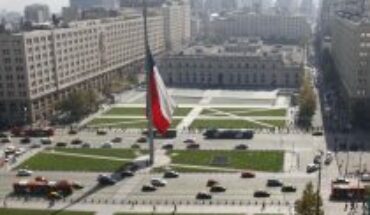Any constituent process, whether a large-scale constitutional reform or, rightly, a change of Constitution experienced by a democratically organized society is due to a crisis in the structure of functioning of its institutions. A mismatch between the expectations and demands of civil society in the face of the possibilities that the power and functions of the State offer to take charge of them.
As the famous Norberto Bobbio says, while dictatorships make demand difficult and the response easy, democracies make demand easy and response difficult. Hence, governance is a permanent challenge of democratic regimes. Above all, in countries such as Chile, where certain levels of capitalist development have been reached with strong aspirations for social mobility, demands for individual autonomy and recognition of collective identities, such as indigenous peoples, sexual minorities, immigrants and other vulnerable groups.
All this protest impulse of recent years, motivated by new technologies and greater participation in the so-called “consumer society”, has radically transformed the world of social communication and the public space, generating an increasingly demanding demand on the part of the community in the probity and transparency of those who hold the most varied forms of power, whether state or business.
This explains, at least in an important part, why the most recent cases of illegal financing of politics, revealed in the last decade, ended up causing a dramatic divorce between Chilean society and the civil political class. And this episode was probably one of the main triggers of the October 2019 crisis, known as the “social outbreak”.
Consequently, we must assume that we are in the presence of a divorce. Assume that the rational consensus that the Concertación de Partidos por la Democracia, later called the New Majority, tried to maintain for thirty years with the political-business right that led the civic-military dictatorship of yesteryear has been definitively broken.
That so-called rationality, in order to merely safeguard economic growth and political stability, no longer gave rise to it.
The “old regime”, which began from the return to democracy in 1990, within the framework of a façade Constitution imposed in 1980 by the dictatorship through a fraudulent electoral consultation, and which has had more than a hundred reforms since the plebiscite of 1989, has experienced countless internal social transformations, which have opened the way to a society radically different from that apparently homogeneous Chile that defeated General Pinochet in the plebiscite of 1988.
And the national agreement of November 15, 2019, signed by almost all political forces for a constituent process in order to seek a solution to the “social explosion”, was nothing but the divorce act of the “old regime”.
Today the Constitutional Convention, a mechanism approved by more than 78% of the citizens in the 2020 plebiscite, with more than two-thirds of its 154 members, all of them citizens, elected with a proportional electoral system, with gender parity and quotas reserved for indigenous peoples, as legitimately approved by a majority in the National Congress, it has offered the country a proposal for a New Constitution very different from all previous constitutional charters.
We are in the presence – it must be said with all its letters – of an authentic “constitutional revolution”, from the moment that the representatives of this new society, fruit of its radical internal transformation experienced in the last three decades, have consecrated their new social structure through the project of a new Fundamental Charter, with all their aspirations and human needs for self-creation and individual and collective self-transformation in its richest diversity of experiences or ways of life.
It is not true that this project is a “Bolivarian revolution” or a “Bolivian constitution.” The text attenuates the powers of the President of the Republic and does not grant him “megapowers”; maintains the bicameral system in Congress; respects the separation of state powers and maintains the hierarchy of the Supreme Court; retains the Office of the Comptroller General of the Republic; incorporates a Constitutional Court with broad powers; maintains the institution of the Public Prosecutor’s Office for the prosecution of crimes; ccitizen control institutions such as the Ombudsman’s Office; institutes judicial mechanisms for the protection of fundamental rights and for amparo or “habeas corpus”; within the framework of a democratic social State governed by the rule of law, it guarantees fundamental rights almost in the same terms as international human rights instruments; universally protects social and cultural rights, while ensuring private property and free enterprise rights, and incorporates other new individual and collective rights, such as free abortion and collective bargaining by production area; it enshrines recognition to indigenous peoples and recognizes their political and territorial autonomy as nations, without prejudice to the unity of the territory of the State. In short, nothing that contradicts the international public order of which Chile is a part.
It is true that this constitutional revolution is not “everyone’s house”. It is something better: “the house for diversity”.
Because this new civil society, divorced from the “old regime” and represented in the Constitutional Convention, invites us to replace rational consensus, which has proven to be a dead letter, with a new public order that promotes a “modus vivendi”. Perhaps more dispersed and improvable, as the project undoubtedly is, but more legitimate to be more representative of the pluralistic society that we are today.
Follow us on
The content expressed in this opinion column is the sole responsibility of its author, and does not necessarily reflect the editorial line or position of El Mostrador.





